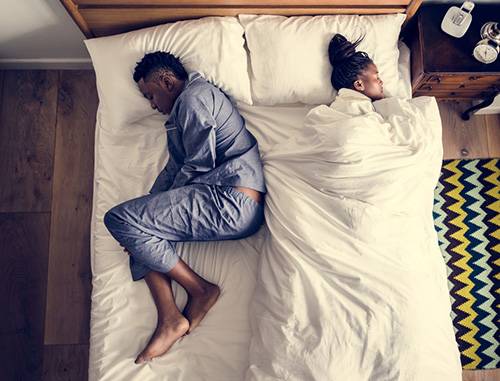Sleep is a personal experience. The better your sleep quality is, the better you will sleep. It doesn’t actually benefit or disadvantage anyone else in your life. For this reason, you should always be the priority when it comes to your sleep, not other people.
It’s an easy rule to follow, until you have a partner who sleeps with you. Naturally, sleeping with your partner is highly affectionate and what everyone wants to do once they have become a couple, but if sleeping with your partner starts to create conflict, is the action really worth the consequences?
Is it Normal to Sleep in Separate Beds?
The first myth to debunk: yes, it is normal to sleep in separate beds. You’ve been doing it your whole life, so why should it not be normal now?
Some people are actually more comfortable having their own space and bed at night than they are sleeping with someone else. You shouldn’t have to compromise on your comfort with someone who cares and understands that your sleep relies on it. One of you or both of you may both be more comfortable with this arrangement, so why not go through with it?
If the mentality of ‘what will others think of us?’ is getting in the way for you, then forget this. What people think or assume about you is irrelevant to your marriage, your happiness, and your well-being. It’s not any of their business what you and your spouse are doing for each other. Sleep and marriage are both personal. If you find that you sleep better on your own than with someone, then it’s your choice to change sleeping arrangements.
And if this isn’t enough to convince it’s nothing to be embarrassed about. Here are statistics behind how many people aren’t as settled with sleeping with a partner as you think everyone is. In the U.S., 75% of married couples will report that their partner disturbs their sleep. 25% of couples take the step to sleep in different beds, and 10% will go further and sleep in separate rooms. You don’t have to go this far, but know it’s okay if you need that personal space.
Reasons Why Couples May Sleep in Separate Beds
There are many reasons why couples decide it’s high time for different beds as the both of you feel disturbed during the night.
There are the common disturbances such as snoring, drooling, and tossing and turning. There might even be RLS (Restless Leg Syndrome) behind all of the tossing and turning which kicks you off the bed. Your partner may also have insomnia, so them getting in and out of bed may wake you up as well.
If you’re a light sleeper, the littlest disturbance may wake you up, and if you’re a heavy sleeper, then you may be causing the disturbance for your partner. There is also sleep apnea one of you may suffer from, or perhaps the presence of a CPAP machine isn’t helping the person not using it.
Different sleep schedules are a huge factor in between couples. Some people have the contrast of day and night shifts, meaning while one person is tired from their long haul of a day, the other is just reaching work prepping for theirs. Some people also use a device right before bed while their partner may not, which can highly disturb their sleep.
Finally, there are preferences. Preferences in mattresses, temperature, and bedding can make a huge difference on how well you sleep. One of you might prefer sleeping cool without the sheets while the other prefers sleeping warmer with a cover constantly on. You might like firm mattresses while your partner prefers softer beds. Are you really okay with making your partner compromise on their comfort at night?
Sleep Deprivation
This will be the outcome of not getting the right amount and quality of sleep for yourself. The longer it happens, the worse the effects toll on you, so it’s better to find the source of your discomfort as soon as possible and do something about it.
- One of the first effects is higher levels of fatigue and grogginess throughout the day. You won’t be as focused and alert as you should be which can damage your productivity levels and work.
- You’ll have lower endurance levels, which ties in with the previous effect. This means you’ll have less energy to get things done throughout the day, and keep yourself active in general.
- Evidently, this can lead to weight gain at a rapid rate, which is unhealthy.
- Many people turn to sedatives or prescription drugs to improve their sleep, but this can have side effects on your overall health.
- You could face additional levels of anxiety, stress, depression, and insomnia. Once you’re diagnosed with these, it creates a cycle of medications to improve your sleep which not everyone is comfortable with.
- There will also be poorer mental and physical health to face, which generally makes you feel bad.
All of this can be summarized into a less healthy lifestyle, which no one wants to face. Finding out your mattress is the issue; you’d find a better mattress. Finding out your sleep schedule is insufficient: you’d change your sleep schedule. Finding out your partner and you disturb one another at night, why would you put up with it?
Is it Bad to Sleep in Separate Beds?
It doesn’t have to be a bad thing at all. Some people find that taking this self-care step helps heal their marriage rather than damage it. The better you sleep, the better you feel throughout the day, and the more willing you are to be nice, accommodating, loving and understanding throughout the day. It’s much better than dealing with the grinch throughout the day instead.
The only way you can make sure this new arrangement doesn’t harm either of you, is to make sure you’re both 100% on board with the idea. If your partner feels abandoned or guilty about your sleep, then take smaller steps such as finding a solution for their physical issue or looking for bedding the both of you enjoy. Use this step as a last resort so you both understand this is for the better, not a fight or dispute taking place. This isn’t you escaping from them, just taking care of yourself.
Staying in the same bed if you know your partner is the reason you don’t sleep too well can develop into resentment, regardless of whether they’re doing it intentionally or unintentionally. This is a point you never want to reach.
Can Separate Beds Affect Sex Life?
Only if you let it. You can allow separate beds to be a sign that your sex life is falling apart, like many people believe, or you can create a healthy system of visiting one another for quality time.
Not being with each other every single night can actually make your sex life more valuable rather than routine. Separate the part of your life that relies on sleep and the part of the relationship that involves sex so that both of you benefit personally and together as much as possible.
Sacrificing your own sleep for someone should never be an option on the table, even if it’s your partner. While some people may take different beds as a bad sign of a depleting relationship, it’s simply a sign that you’re taking your health into your own hands.
Alternate Solutions
If you’re still not comfortable with the idea of sleeping in another bed separate from your partner, then there are so many other solutions you can filter through.
Find a larger bed, a different firmness for your mattress, or new bedding to compliment your comfort level. You should look for features such as motion isolation, temperature regulation, adjustable firmness, quiet interior, and pressure relief.
You can get a white noise machine to block out snoring, purchase earplugs to keep noise out, play some of your favourite music, and more. If the sun is an issue, then get blackout curtains. Get a heated blanket if only one of you likes sleeping warm, and invest in twin-sized bedding so you don’t have to share your blankets and covers.
There are so many things you can do to improve your own sleep without leaving your partner’s side.
In the end, whether you and your partner are okay with sleeping in different beds at night is between the two of you. What’s truly important is finding a solution which works for the both of you without harming trust, closeness, and understanding between you, and making sure your sleep comes first.
Photo credit: Gorodenkoff/Shutterstock; Everett Collection/Shutterstock;
VGstockstudio/Shutterstock; Frantisek Czanner/Shutterstock; Realstock/Shutterstock;
Rawpixel.com/Shutterstock; PPstudio/Shutterstock;









